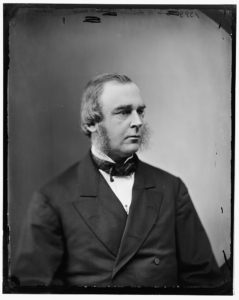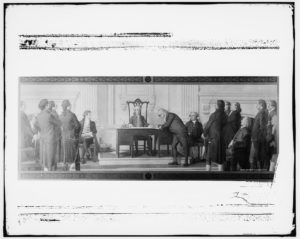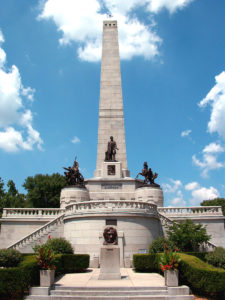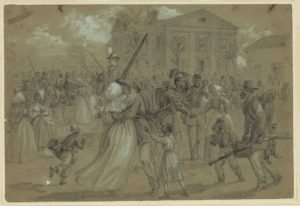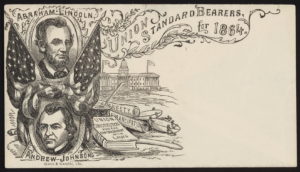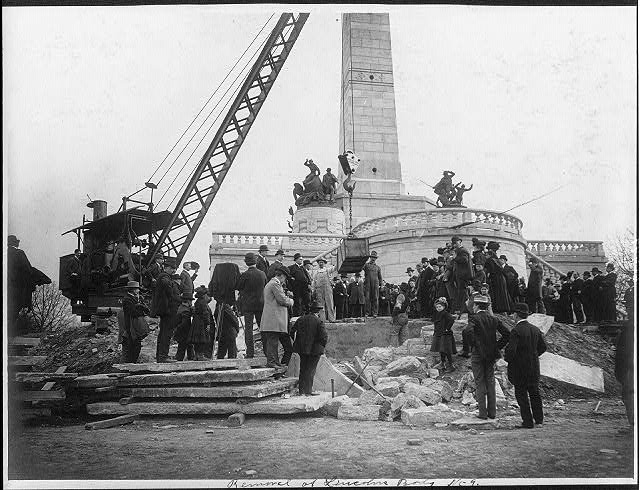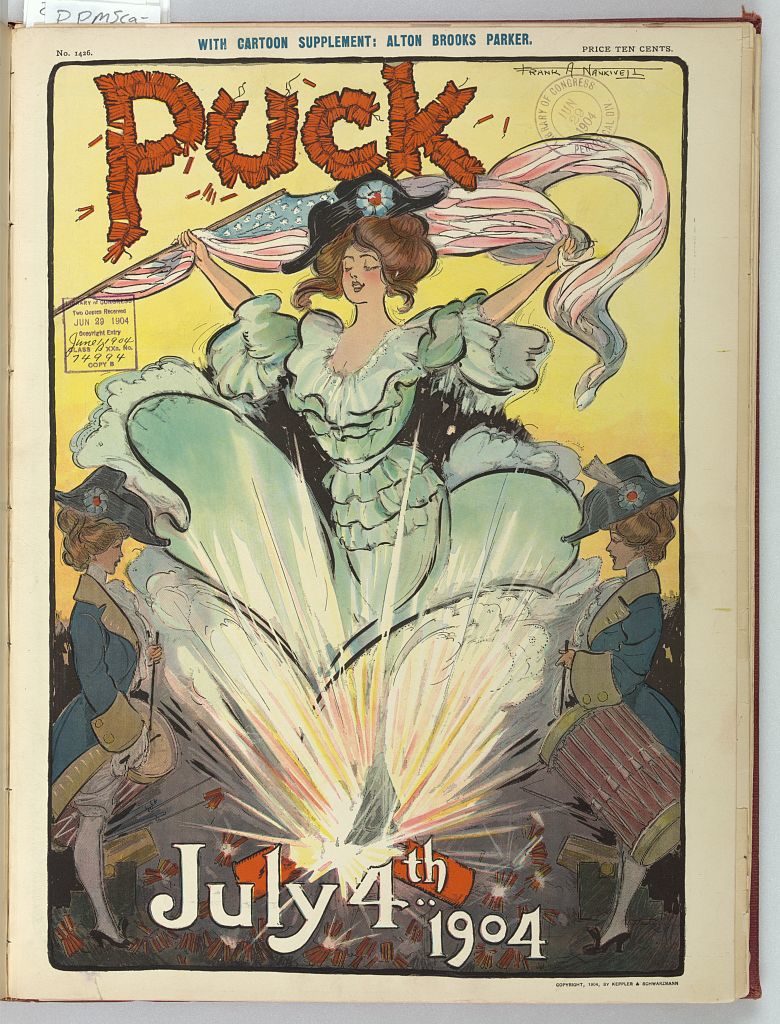150 years ago today Massachusetts state representative George Bailey Loring delivered an Independence Day oration at Newburyport, Mass. He paid homage to Abraham Lincoln and declared the supremacy of the federal government. He disagreed with President Andrew Johnson’s objection to the federal Congress excluding representatives from the rebel southern states. Here’s some sound:
Fellow – Citizens : — We have gathered here on this anniversary of the Declaration of our National Independence, to renew our offerings, and repeat our prayers, within the sacred edifice erected by our fathers to the cause of free government, popular intelligence, universal philanthropy, and public education, morals, and religion. Ninety years ago they laid the cornerstone. Commencing with the simple declaration of human equality, they devoted their lives, their fortunes, and their sacred honor to the completion of the great civil fabric. “They builded better than they knew.” Battles, sieges, and privation, and bankruptcy, and sorrow, frost, snows and starvation brought indeed no terror to their hearts. …
There have been many martyrs in the church and state — but one LINCOLN. To him above all men was it given so to die by the assassin’s hand, as to seal with his blood the cause for which he lived and labored. Never was there a story like his. … saying of slavery, with a sweet spirit of kindness and consideration worthy of a wife and a mother, “it forces so many really good men amongst ourselves into an open war with the very fundamental principles of civil liberty,”—calling on his people with a sublime and fervid eloquence, ” think nothing of me; take no thought for the political fate of any man whatever; but come back to the truths that are in the Declaration of Independence; you may do anything with me you choose, if you will but heed these sacred principles. … do not destroy that immortal emblem of humanity — the Declaration of Independence …”
He must be less than a man, less than an American, my friends, who could perform any public service this day, even expressing the smallest tribute of regard for our national institutions, without allusion to the work of reconstruction which is now going on, as a consequence of the anarchy, confusion and disruption of the war. I am brought to it, here in your presence, by the memories of the past, and by that path which has led me, in my discourse, to the sacred grave of Abraham Lincoln, around which cluster his wise and humane counsels, and his large christian devotion to mankind and his country. We are reminded here of his high resolve, during all the trials and doubt of the last year of the war, the long and weary and bloody gloom of the Wilderness, and during the political uncertainty which unnerved the brave and faithful, — his high resolve to listen to no terms of peace which did not embrace “the integrity of the whole Union, and the abandonment of slavery.” We are reminded here of his determination “not to be inflexibly committed to any plan of restoration,” until all the complications and difficulties of the times were fully unfolded, provided always that in any event, free citizenship with all its rights and immunities should take the place of slavery. …
There is no time here to argue the question of reconstruction. But I claim that the Federal Government has at last vindicated its right to self-defence, its supreme nationality, and its power to declare and fix uniformly and everywhere within its jurisdiction, a free American citizenship, untrammelled by local law, and unobstructed by local prejudice. I go further; and I maintain that no local legislation should be allowed to abridge this citizenship, in respect of the ballot box. The government which can make soldiers of its people, should also make citizens, and of citizens, voters — granting and establishing impartial suffrage, so supreme, that no caprice of State or section should ever curtail it. I know no other foundation for State equality in the Union than this. American citizenship will be a farce and a sham so long as a State dependent upon the general government for its very existence, shall arrogantly exercise the power of declaring, that no person shall be a citizen, who cannot trace his descent from some one particular branch of the human family. A thinking, reasoning man passes from the open courts, and school houses, and colleges and churches of Massachusetts into another State, and on account of some accident of birth, he finds all these institutions closed to him, his right to hold property gone, his right to equal civil privileges destroyed, the ballot box as far from him as it is from the exile wearing away his life in the lonely forests of Siberia. …
If we still hesitate to invite the Senators and Representatives of States, even now hugging slavery and rebellion to their bosoms, all will be well. If we will insist upon it, that a State which allows its judges to sell men into slavery as a punishment for crime, and to bind black children to a bondage worse than slavery, because possessed of none of its domestic ties and interests, is not fit to participate in the work of free government, all will be well. Let us remember that, today, without the protection of the Freedman’s Bureau, supported as it is by the military power of the government, the negro could not pursue any employment in safety at the South. These new-born citizens of the United States are hunted down in the streets, a price set upon their heads, as if they were wolves, every form of ingenuity exercised to deprive them of a fair reward for their labor, by those who were born with the bitterest contempt for their color, and who have been taught to detest their protector —that government which they could not overthrow. The maddened press of the South clamors still for another revolution. …
But, my friends, they say there are objections to this. The President objects; and his objections, as far as I have been able to ascertain from his various vetoes and messages, are based mainly on the ground that “of thirty-six States which constitute the Union, eleven are excluded from representation in either House of Congress,” and have no voice in any amendments or enactments now proposed for the effectual business of reconstruction. But had these States any voice in the organizing of that army with swept through them with fire and sword, wasting their fields, defeating their sons, chastising their folly with the flaming sword of the destroying angel? Had they any voice in the organization of that policy which sent Andrew Johnson to Tennessee as military governor, gave Butler and Banks the rule of Louisiana, established martial law and military punishments within their borders? Had they any voice in that amendment to the constitution, which confirmed freedom on four millions of the sons of men, which they held in bondage by solemn enactments on their statute books? …
But the South objects to the plan of Congress. So also does it object to the plan of the President, hitherto pursued. It is not to be supposed that any policy can be particularly gratifying to those, who are obliged to submit in any event. The South, however, should not object. If there are those, in that section of our country, who desire their own local honor and prosperity, let them rise to the magnitude of the occasion. If they desire to write their names in history, with the benefactors of their race, and with the immortal statesmen who have created new glories, from the seeming misfortune of their country, let them teach their followers the way to human elevation, through education, and the institutions of universal freedom. What a glorious reward awaits the liberal and advancing young men of the South! The South should not object. …
My friends, there is among the heraldic devices which have been brought to this country, preserved from the lineage of the old world, and upon which I have often pondered, as expressing all that there is of patriotism, of true government, of social order and elevation, of the christianity of civil life : — Ubi libertas, ibi patri: — where freedom is, there is my country. Let that motto be ours forever, that the hopes of the fathers of the Republic may all be fulfilled.

